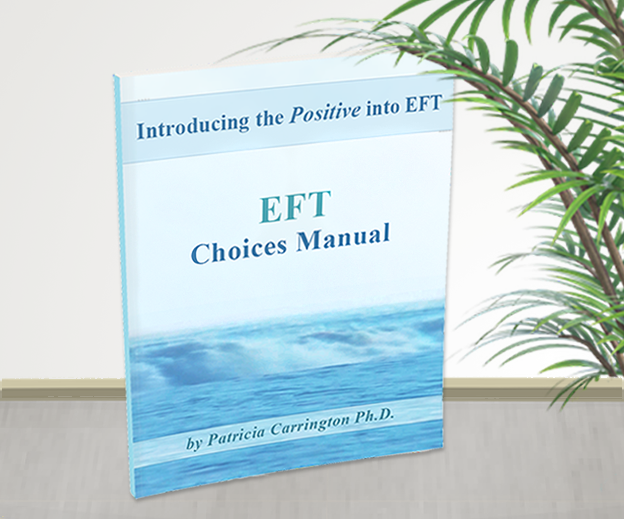QUESTION: My husband’s father is on the verge of dying from cancer. My husband and I are both new to EFT (we’re in our early 30’s) and he is concerned that he won’t like not feeling the pain of his father’s death. He wants to feel it, not in an incapacitating way but in a human way. Would EFT make him feel hollow or emotionless at his father’s death? Would he ‘not feel’ the sadness? Could he undo the treatment if he didn’t like it?
ANSWER: Actually, yours is a question which can be answered with a good deal of clinical evidence to back it up. I have often been asked whether EFT will take away from a person a response that is healthy, normal, and desirable. People are frequently concerned, for example, that if EFT removes their fear of heights, they may then recklessly walk on the edge of cliffs without appropriate safeguards in place. In other words, they are afraid they will lose intelligent caution because they have tapped away their irrational fear.
However, as Gary Craig has pointed out many times this is not what happens. EFT never takes away a response that is useful for the system. With respect to your father-in-law’s impending death and your husband’s natural wish and need to feel, as any caring son would, the impact of the loss and the emotional meaning of the transition — — I can say with great certainty from my experience with EFT in situations somewhat similar to this, that EFT will not take away these desirable human responses.
So, I would like to suggest to you some ways in which EFT might be used, not only to support your husband during this difficult time, but also to enrich the meaning of your father-in-law’s passing for all concerned — including, quite possibly, for your father-in-law himself.
Here are

|
some EFT Choices which your husband may want to incorporate when he taps for this situation. If you do not know about the EFT Choices Method (on which these recommendations are based) you may might want to read Chapters 11 and 12 of my Choices Manual which talks about the use of Choices in times of disaster. While yours is not a natural disaster as described in the manual, it represents a shock to the family. Impending death and loss of a close family member is a challenge to anyone, and many of the Choices suggested in the manual for use with such extremely difficult circumstances as those of September 11th, for example, should help your husband, yourself, and other family members, in this transitional period.
My advice here, however, depends upon the particular issues with regard to your father-in-law that concern your husband. A number of possible issues come to my mind which might apply under circumstances like this. Such as…
Is your husband having difficulty seeing his father undergo pain, or seeing unwanted emotions arising in him during this period prior to his death?
Does he perhaps fear, on some level, being finally without a father (loss of a parent can be a challenge for anyone at any age)?
Is there some unfinished business (on an emotional level) with his father? — Old issues which have not been resolved and which now will not be resolved in this lifetime because his father will no longer be here? I can only guess that it might be some of these issues that he will want to tap on, or perhaps it will be something quite different, but the following suggestions should give you some leads.
With respect to witnessing the illness and impending death of his father, your husband might want to tap on some variations of the following set-up phrases:
“Even though it’s very difficult to see my father’s pain and distress at this time, I choose to find this an opportunity to become remarkably close to him in a way not possible before.”
Or (using the same FIRST PART of the set-up phrase as above) he might use one of the following Choices for the LAST PART: “…I choose to know exactly how to be of the greatest help to him“.
Or, “… I choose to be comforted knowing that it will not be too long now before he will be truly at peace“.
Or, “… I choose to admire and learn from the courage he is showing.”
Or, “… I choose to reach out and communicate with him in a new way.”
If the issue your husband faces (often the case for many people in this situation) is that he has regrets with respect to some aspect of his relationship with his father in the past, then he might try some variations of the following:
“Even though there are some things that I wish had been very different between us, I choose to find this a time of healing for both of us.”
Or, (for the LAST part of the sentence): “… I choose to use this time of unusual closeness and intensity to heal some of our old problems in a surprising way.”
If the issue is some fears and doubts and uncertainties your husband may have about how it will feel to be fatherless in this world — this can be a problem at any age because on some level we are all children at heart — then your husband might try one of these set-up phrases:
“Even though I’m shocked by the thought that I will be without my father for the rest of my life, I choose to be more aware than ever of all the good things he gave to me, knowingly or unknowingly. “
Or, “… I choose to know that the best of him will live on in us, and be stronger because of this fact.”
Or, “I choose to cherish the happy memories of him which will give me much comfort.”
I have found that if somebody uses EFT to prepare for an impending death of a loved one, or for grieving after that person has died, that its use can often transform the personal pain (and any resentment at the very fact of the loss) into a new feeling about the person who has gone. Those who have used EFT to handle this sort of situation have found that the surviving person’s memories of the departed person now are much more selective —more and more they tend to remember the good times and wonderful things about the person who has passed away. This is, after all, the supreme way to honor anyone. After using EFT, what hasn’t been perfect in the relationship is washed away, and what it is memorable, the true gems of the relationship are retained.
I hope your husband will use EFT creatively at this time so that the experience of his father’s illness and death becomes one of growth on a fulfilling level for all concerned. This is quite the opposite of numbing oneself, or hardening oneself to a blow. If he can use EFT in this manner, it will not only benefit himself and the rest of the family, but indirectly in some manner his new positive attitude may also be conveyed to his father, even if his father is barely conscious. This can occur through your husband’s tone of voice, gestures, and words and above all by the change in his energy field. In this way, by using EFT to resolve these issues within himself, your husband will be assisting his father to move on peacefully, with a sense of completion — a true gift.
I hope these thoughts help you and your husband to move gracefully through this transition, and that they may also help those readers who may be facing similar crises, or helping others to face them.
EFT Master, Dr. Patricia Carrington





